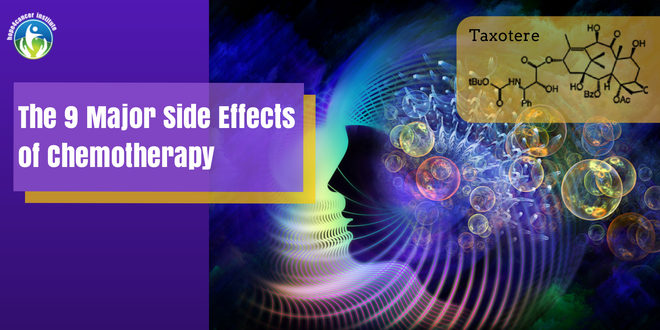The 9 Major Side Effects of Chemotherapy -Part I
This is the first of a two-part series that talks about the side effects of chemotherapy, and what measures doctors take to help patients cope with them. Knowing different aspects of treatment protocols can allow patients to make well-informed decisions.
Different people react to treatment in different ways. It is difficult to tell exactly what side effects you will get while you undergo any treatment, and chemotherapy is not very different in that regard. However, most chemotherapeutic drugs are essentially cellular poisons – as a result, the side effects have a significant role to play in drastically reducing quality of life and often becoming an important cause of enhanced morbidity and mortality. Many studies claim that chemotherapy has not proven its worth, with statistics showing that it has only a marginal effect if any in increasing 5-year survival rates for cancer patients.
Because of their ability to harm perfectly healthy cells, chemotherapy is known to cause various side effects throughout the body. While in some cases doctors can justify the use of chemotherapy, it is important for a cancer patient to be well informed about the possibilities before they blindly accept a treatment protocol.
This article takes a “systemic” view to the side effects of chemotherapy – looking at the most common side effects of that affect different body systems. While it is unlikely that a patient will experience them all, it is important that they are aware of the possibilities of each:
- Psychological and Emotional Effects
- Skeletal System Effects
- Excretory System Effects in Kidneys and Bladder
- Sexual and Reproductive System Effects
- Integumentary System Effects in Hair, Skin, and Nails
- Digestive System Effects
- Nervous and Muscular Systems Effects
- Circulatory System Effects
- Immune System Effects
Psychological and Emotional Effects
Psychological and emotional trauma are, for the most part, secondary effects of dealing with the primary side effects of chemotherapy. Living with the effects of chemotherapy can be frustrating, stressful and traumatic. It is natural to feel ongoing anxiety and concern about whether your treatment will be successful. Effects can become overwhelming.
You may also get worried, stressed, or anxious about your looks and your health. Some people may suffer from depression. You get worried about your work, financial matters, and family responsibilities while you undergo cancer treatment.
Complementary therapies like massage and meditation for relaxation and relief may be helpful. Professional counseling may be necessary if feelings of depression persist.
[Hope4Cancer Note: Sustaining “Spiritual and Emotional Integrity” is one of our Seven Key Principles of Cancer Therapy that we incorporate into our patient’s treatment program.]
Skeletal System Effects
According to the National Institutes of Health (NIH), women who have been treated for breast cancer are at increased risk for osteoporosis and bone fracture. This is due to the combination of the drugs used that cause a drop in the estrogen levels. Osteoporosis increases the risk of bone fractures and breaks. The most common areas of the body to suffer breaks are the spine and pelvis, hips, and wrists. Compensating with hormone therapy brings its own side effects to the table.
Some chemotherapy drugs can cause calcium levels to drop and contribute to accelerated bone loss. This can lead to cancer-related osteoporosis, especially in post-menopausal women and those whose menopause was brought on suddenly due to chemotherapy.
Excretory System Effects in Kidneys and Bladder
The kidneys work extra hard to excrete the powerful chemotherapy drugs as they move through your body. Drinking plenty of fluids is recommended by doctors to flush the medication from your system and minimize the pressure on the excretory system. Some medications cause urine to turn red or orange for a few days but this isn’t cause for concern.
Some kidney and bladder cells can become irritated or damaged while undergoing the process. Symptoms of kidney damage include decreased urination, swelling of the hands and feet (edema), and headache. Symptoms of bladder irritation include a feeling of burning when urinating and increased urinary frequency.
Sexual and Reproductive System Effects
Interest in sex decreases during chemotherapy as experienced by some patients. But that is only one of the possible side effects.
Effects in Women:
- Hormonal Changes: brings on hot flashes, irregular periods, or sudden onset of menopause.
- Temporary or Permanent Infertility: In most cases, this scenario is reversible once the treatment is discontinued.
- Dryness of Vaginal Tissues: Can make intercourse uncomfortable or painful.
- Vaginal Infections: The chance of developing vaginal infections is increased.
- Birth Defects: Can cause birth defects due to chemotherapy drugs given during pregnancy.
- Can Reduce Ability to Conceive.
Chemotherapy drugs can have an effect on hormones that also affects men. Some chemotherapy drugs can harm sperm or lower sperm count, and temporary or permanent infertility is also possible.
Integumentary System Effects – Hair, Skin, and Nails
Chemotherapy drugs can cause the following:
- Hair loss (alopecia) within a few weeks of the first treatment is a commonly observed side effect of most chemotherapy drugs. Hair loss can occur on the head, eyebrows, eyelashes, and body. As troubling as it can be, hair loss is temporary. New hair growth usually begins several weeks after the final treatment.
- Minor skin irritations like dryness, itchiness, and rash. You may develop sensitivity to the sun, making it easier to burn. Your doctor can recommend topical ointments to soothe irritated skin.
- Fingernails and toenails may turn brown or yellow, and become ridged or brittle. Nail growth may slow down, and nails may crack or break easily. In severe cases, they can actually separate from the nail bed. It’s important to take good care of your nails to avoid infection.
Digestive System Effects
The following are some digestive system effects of chemotherapy:
- Mouth sores and dry mouth can make it difficult to chew and swallow. Sores also may form on the tongue, lips, gums, or in the throat. Mouth sores can make you more susceptible to bleeding and infection. Food may taste unusual or unpleasant. Many patients complain of a metallic taste in the mouth, or a yellow or white coating on the tongue.
- Can harm cells along the gastrointestinal tract. Nausea is a common symptom, and may result in bouts of vomiting. However, anti-nausea medications given in conjunction with chemotherapy drugs can help alleviate this symptom.
- Loose stools or diarrhea. In some people, hard stools and constipation can be a problem. This may be accompanied by pressure, bloating, and gas.
- Can contribute to loss of appetite and feeling full even though you haven’t eaten much.
- Weight loss and general weakness are common. Chemotherapy disables the gastrointestinal tract from properly assimilating nutrients from food, resulting in malnourishment.
Despite all this, it’s important to continue eating healthy, well-balanced foods and drinking plenty of water throughout the day to avoid dehydration.
Nervous and Muscular Systems Effects
We all know that the central nervous system controls our emotions, thought patterns, and coordination. Chemotherapy drugs may have these effects:
- Problems with memory, or make it difficult to concentrate or think clearly. This symptom sometimes is called “chemo fog,” or “chemo brain.” This mild cognitive impairment may go away following treatment, or may linger for years. Severe cases can add to anxiety and stress.
- Pain, weakness, numbness, or tingling in the hands and feet (peripheral neuropathy). Muscles may feel tired, achy, or shaky.
- Reflexes and small motor skills may be slowed.
Refer to your doctor when you have unusual condition or when you experience problems with balance and coordination.
Circulatory System Effects
The cells is our bone marrow are also harmed by chemotherapy drugs, thus blood production (both red blood cells and white blood cells) are affected. This can result in several problems. Red blood cells carry oxygen to tissues. Anemia occurs when your body doesn’t produce enough red blood cells, making you feel extremely fatigued. Other symptoms of anemia include:
- light-headedness
- general weakness
- difficulty thinking
- pale skin
- feeling cold
Neutropenia is the lowering of your white blood cell count, which is a major side effect of chemo drugs. White blood cells play an important role in the immune system: they help fight infection and ward off illness. Symptoms aren’t always obvious, but a low white blood cell count raises the risk of infection and illness. People with an immune system weakened by chemotherapy must take precautions to avoid exposure to viruses, bacteria, and other germs.
Cells called platelets help the blood clot. A low platelet count, called thrombocytopenia, means the patient is more likely to bruise and bleed easily. Symptoms include nosebleeds, blood in vomit or stools, and heavier-than-normal menstruation.
Other effects of chemo drugs in the heart:
- cardiomyopathy – weakening of the heart muscle
- arrhythmia – disturbed heart rhythm
- affect the heart’s ability to pump blood effectively
- increase the risk of heart attack.
These problems are less likely to occur if your heart is strong and healthy at the start of chemotherapy.
Immune System Effects
Immune System essentially means the body’s defense mechanisms.
We know that traditional cancer treatments can suppress the patient’s immune system causing it to slow down dangerously. It is also a fact that the stress one feels when diagnosed with cancer can also contribute to weakening the body’s defenses.
Undergoing chemotherapy, can cause damage to your healthy white blood cells which are normally called the backbone of your immune system. A low white blood cell count will make you feel weak, prone to infections, including those caused by viruses, bacteria, and fungi. When your white cells are low, it can quickly raise into a serious health threat.
Chemotherapy works by killing those cancer cells, but the downside is that it can affect your white blood cells that protects you from susceptible infections.
Sudden Death and Cancer-Causing Effects of Chemotherapy:
What we haven’t discussed in this paper are the many reports that indicate that chemotherapy can itself cause sudden death or induce the growth of resistant cancers. Unlike surgery, there are no metrics available for death caused by chemotherapy within the first 30 days of treatment, which would give an indication of the death-inducing toxic effect of chemotherapy.
Reuben Chow, writer on Natural News, reports a study that was carried out by the National Confidential Enquiry into Patient Outcome and Deaths in Britain, composed of inductees from British Medical Royal Colleges. They analyzed data 600 cancer sufferers in the country who had passed on within 30 days of treatment. The majority of the said patients had already been declared “incurable” by doctors, and had been put on chemotherapy for palliative purposes.
And the study found that about 1 in every 4 of such deaths had either been sped up or even caused by chemotherapy. The study’s findings also included the discovery that 2 out of every 5 of the patients had suffered significant poisoning from the treatment.
Learn more:
http://www.naturalnews.com/025499_cancer_chemotherapy_treatment.html##ixzz38tVKCBU7
In the next article in this series we focus our attention on what chemotherapy practitioners prescribe to patients to reduce the impact of chemotherapy in their lives.

